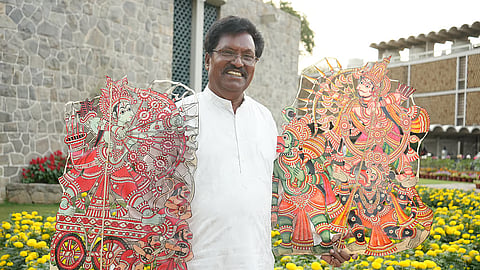
- LIFESTYLE
- FASHION
- FOOD
- ENTERTAINMENT
- EVENTS
- CULTURE
- VIDEOS
- WEB STORIES
- GALLERIES
- GADGETS
- CAR & BIKE
- SOCIETY
- TRAVEL
- NORTH EAST
- INDULGE CONNECT

Togalu Gombeyatta, or “leather doll play” in Kannada, is a traditional shadow puppetry form from Karnataka, where handmade leather puppets bring epics and folktales to life. As this ancient art form fades into obscurity, Gunduraju, a ninth-generation puppeteer from Hoovinahalli, Karnataka, is committed to keeping his 200-year-old family legacy alive. At the second edition of Puppetoscope, an international puppet film festival curated by the Katkatha Puppet Arts Trust in Delhi, he and and his family performed a condensed, nine-hour version of the Ramayana—from Panchavati to the climactic war—just ahead of Ram Navami.
Gunduraju was just five when his training started. “I would sit with my mother during shows and my father would encourage me to say and sing my lines.” At 66, he still performs—now alongside his son and grandson. Drawing from the Ramayana, Mahabharata, Bhagavad Gita and other mythological texts, his performances once brought life to temple fairs across Karnataka. “In my childhood, every village had a show. Every temple fair had puppetry. Every day, there was something happening,” he says. While the tradition has thinned out, Gunduraju has found ways to keep it relevant.
Each puppet is made at home using goat leather. “We take raw leather, clean it, and treat it until it feels like plastic. Then we draw the outlines, colour them, and bring them to life,” he explains. “We have to make the puppets ourselves—you can’t find them anywhere else.” Traditionally, deer skin was used, but as times changed, goat leather became more accessible.
Popularising the craft
Gunduraju has received numerous accolades for his performances, including a silver medal at the 3rd Delphic Games in Korea (2009) and the Jnana Vignana Award from the Karnataka Janapada Yakshagana Academy. He has staged performances across Karnataka’s schools and villages on themes like HIV awareness, national integration, and Swachh Bharat. “I work with the Sangeet Natak Akademi in Bengaluru. Through them, I’ve done many awareness programmes,” he says. His craft has also travelled well beyond Karnataka—reaching France, South Africa, South Korea, Zimbabwe and more. Over the years, he has also taught puppetry-making to many from around the globe.
Still, puppetry alone doesn’t pay the bills. “I’m a farmer too,” he says plainly. “You can’t live off puppetry alone. But if your goal is only money, this art won’t survive. I want to preserve it. God has given me enough to live—my art must also live.” Apart from puppetry and farming, Gunduraju is also involved in local theatre. He directs and acts in plays with drama troupes from his area and has worked on traditional productions like Ramayana and the Mahabharata.
While the government provides some support on paper, Gunduraju says much of it gets lost in bureaucracy. “There are mediators now. They take money from the government, give us a small portion, and get the show done. The real artists don’t benefit,” he says. “I have to go above and beyond to keep puppetry alive. The villagers, not the institutions, are the ones who keep this art breathing.”
When asked what it means to be a traditional artist in a fast-changing world, Gunduraju doesn’t mince words. “We say we are modern. What is modern?” he asks. “It’s still the same Duryodhana. The same Shakuni. Earlier, people fought with knives. Now they use bombs and guns. Back then, one person died at a time. Now whole cities vanish. Where is humanity in this? What’s modern about that?”
For him, Togalu Gombeyatta is not just a performance—it’s philosophy. “True tradition reminds us: the earth, the sky, the water—they belong to everyone. Protect them. Eat, drink, live peacefully. Let others live too. You don’t need to kill to prove you exist. This isn’t just art. It’s a message.”
This article is written by Adithi Reena Ajith